21.
I was so tired that in spite of the crowded compartment, the chatter, the slammed doors, the loudspeaker announcements, the long whistles, the jangling, I slept for hours. The problems began when I woke up. I immediately touched my head, convinced that I was bald, I must have had a bad dream. But whatever I had dreamed had vanished, leaving only the impression that my hair was coming out in clumps, more than Giuliana’s, not my real hair but the hair my father had praised when I was a child.
I kept my eyes closed, half asleep. Giuliana’s extreme physical closeness seemed to have infected me. Her desperation was now mine, too, she must have transmitted it to me, my body was wearing out the way hers had. Frightened, I forced myself to wake up completely, but Giuliana with her torments stayed fixed in my mind just as I was traveling toward her fiancé.
I was irritated, I couldn’t bear my fellow passengers, I went out into the corridor. I tried to console myself with quotations on the power of love, which, even if you wanted to, are impossible to avoid. They were lines of poetry, sentences from novels, words read in books I had liked and transcribed in my notebooks. But Giuliana wouldn’t fade, especially that gesture that left locks of hair in her hand, a part of herself that came off almost gently. Without any obvious connection I said to myself: even if I don’t have the face of Vittoria yet, soon that face will lay itself on my bones and never go away.
It was an ugly moment, maybe the worst of those ugly years. I was standing in a corridor identical to the one where I had spent much of the previous night listening to Giuliana, who, to be sure of my attention, took my hand, pulled my arm, continuously jostled my body with hers. The sun was setting, the bluish countryside was pierced by the rumble of the moving train, another night was descending. Suddenly I was able to say to myself clearly that I didn’t have noble intentions, I wasn’t making that new journey to recover the bracelet, I didn’t intend to help Giuliana. I was going to betray her, I was going to take the man she loved. I, much sneakier than Michela, intended to drive her out of the place that Roberto had offered her at his side and destroy her life. I felt authorized to do it because a young man who seemed to me extraordinary, more extraordinary than I considered my father when he had let slip that I was starting to get Vittoria’s face, had said, on the contrary, that I was beautiful. But now—as the train was about to enter Milan—I had to admit that, just because, proud of that praise, I was going to do what I had in mind, and just because I had no intention of being stopped by anyone, my face could only be a copy of Vittoria’s. Betraying Giuliana’s trust, I would in fact become like my aunt when she destroyed Margherita’s life, and, why not, like her brother, my father, when he destroyed my mother’s. I felt guilty. I was a virgin and that night I wanted to lose my virginity with the only person who had given me, thanks to his enormous authority as a male, a new beauty. It seemed my right, that was how I would enter adulthood. But as I got off the train I was scared, that wasn’t the way I wanted to grow up. The beauty that Roberto had recognized in me too closely resembled the beauty of someone who hurts people.
22.
I thought I had understood, on the phone, that he would meet me on the platform as he had Giuliana and me, but I didn’t find him there. I waited a little, I phoned. He was sorry, he was convinced that I was coming to his house, he was working on an essay that he had to deliver the next day. I was depressed, but I didn’t say anything. I followed his directions, took the metro, got to his house. He greeted me cordially. I hoped he would kiss me on the mouth, he kissed me on the cheeks. He had set the table for dinner, made by the helpful concierge, and we ate. He didn’t mention the bracelet, he didn’t mention Giuliana, nor did I. He talked as if he needed me to clarify his ideas on the subject he was working on, and I had taken the train again purposely to listen to him. The essay was about compunction. He kept calling it training to prick your conscience, traversing it with needle and thread as if it were a piece of fabric out of which you’re making a garment. I listened, he used the voice that had enchanted me. And I was again seduced—I’m in his house, among his books, that is his desk, we’re eating together, he’s talking to me about his work—I felt I was she who was necessary to him, exactly what I wanted to be.
After dinner he gave me the bracelet, but he did it as if it were toothpaste, a towel, and still made no reference to Giuliana: as if he’d eliminated her from his life. I tried to conduct myself the way he did, but I couldn’t do it, I was overwhelmed by the thought of Vittoria’s goddaughter. I knew much better than he did what physical and mental condition she was in, far from that beautiful city, far from that apartment, down, down, down on the edge of Naples, in the dreary house with the big photograph of Enzo in uniform. And yet we had been together in that room a few hours before, I had seen her in the bathroom while she dried her hair and masked her distress in the mirror, while she sat beside him in the restaurant, while she clung to him in the bed. Was it possible that now she seemed dead, I was there and she wasn’t? Is it so easy—I thought—to die in the life of the people we can’t live without? And on the thread of those thoughts, while he was talking about something or other in a sweetly ironic way—I was no longer listening, I caught only some words: sleep, sofa bed, the crushing darkness, staying awake until dawn, and at times Roberto’s voice seemed the most beautiful among my father’s voices—I said discouraged:
“I’m really tired and scared.”
He said:
“You can sleep with me.”
My words and his couldn’t fit together, they seemed to be two consecutive remarks but they weren’t. Spilling out into mine was the madness of that exhausting journey, Giuliana’s despair, the fear of making an unforgivable mistake. In his was the end point of an allusive walk around the difficulty of opening the sofa bed. As soon as I realized it, I answered:
“No, I’ll be fine here.”
And, in demonstration, I curled up on the couch.
“Sure?”
“Yes.”
He said:
“Why did you come back?”
“I don’t know anymore.”
A few seconds passed, he was standing, looking at me from above, sympathetically, I was on the couch, staring at him from below, confused. He didn’t lean over me, he didn’t caress me, he said nothing but good night and withdrew into his room.
I settled myself on the couch without getting undressed, I didn’t want to deprive myself of the armor of my clothes. But soon I had a desire to wait for him to fall sleep, to go and get in his bed with my clothes on, just to be near him. Until I met Roberto I had never felt a need to be penetrated, at most I had felt some curiosity, immediately distanced by the fear of pain in a part of the body so delicate I was afraid that, touching it, I would scratch myself. After seeing him in the church I had been overwhelmed by a desire as violent as it was confused, an excitement that resembled a joyful tension, and that, while it certainly hit my genitals, as if swelling them, then spread out through my whole body. Nor, after we met at Piazza Amedeo and the occasional brief encounters that followed, had I ever imagined that he could enter me; rather, if I reflected on it, the rare times I’d had fantasies of that sort it had seemed to me a vulgar act. Only in Milan, when, the morning before, I had seen him in bed with Giuliana, I had had to admit that, like every man, he, too, had a penis, limp or erect, he put it inside Giuliana like a piston and would have been willing to put it inside me. But even that affirmation hadn’t been decisive. Certainly, I had made the new journey with the idea that there would be that penetration, that the erotic scenario vividly drawn by my aunt long ago would concern me. Yet the need that impelled me required something different, and now, in my half sleep, I realized it. In the bed, next to him, I wanted to enjoy his respect, I wanted to discuss compunction, God who is sated while so many of his creatures are dying of hunger and thirst; I wanted to feel that I was much more than a cute or even very beautiful small animal with whom a brilliant male can play a little and distract himself. I fell asleep thinking sorrowfully that that, precisely that, would never happen. Having him inside me would have been easy, he would have penetrated me even now, in sleep, without surprise. He was convinced that I had returned for that type of betrayal and not for betrayals that were much more ferocious.
Читать дальше
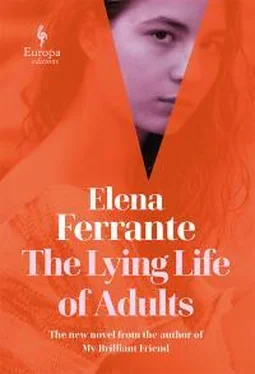
![Элена Ферранте - История о пропавшем ребенке [litres]](/books/32091/elena-ferrante-istoriya-o-propavshem-rebenke-litres-thumb.webp)

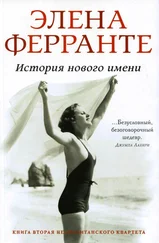
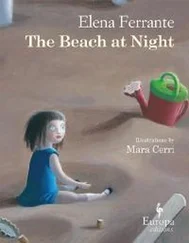
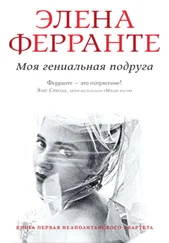
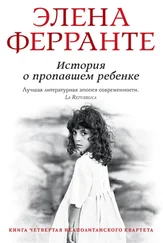
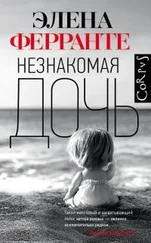
![Элена Ферранте - Дни одиночества [litres]](/books/404671/elena-ferrante-dni-odinochestva-litres-thumb.webp)



